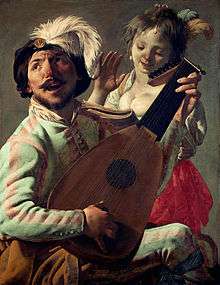lute
English

Pronunciation
- (Received Pronunciation) IPA(key): /l(j)uːt/
- (General American) IPA(key): /luːt/
Audio (UK) (file) Audio (US) (file) - Rhymes: -uːt
- Homophone: loot (in accents with yod-dropping)
Etymology 1
From Middle French lut (modern luth), from Old French leüt, probably from Old Occitan laüt, from Arabic اَلْعُود (al-ʿūd, “wood”) (probably representing an Andalusian Arabic or North African pronunciation). Doublet of oud.
Noun
lute (plural lutes)
- A fretted stringed instrument of European origin, similar to the guitar, having a bowl-shaped body or soundbox; any of a wide variety of chordophones with a pear-shaped body and a neck whose upper surface is in the same plane as the soundboard, with strings along the neck and parallel to the soundboard.
- Coordinate term: guitar
Derived terms
Translations
|
|
References
- 2004. Musical Instruments: History, Technology, and Performance of Instruments. Murray Campbell, Clive A. Greated, Arnold Myers. Pg. 285.
Verb
lute (third-person singular simple present lutes, present participle luting, simple past and past participle luted)
- To play on a lute, or as if on a lute.
- Tennyson
- Knaves are men / That lute and flute fantastic tenderness.
- (Can we find and add a quotation of Piers Plowman to this entry?)
- (Can we find and add a quotation of Keats to this entry?)
- Tennyson
Etymology 2
From Old French lut, ultimately from Latin lutum (“mud”).
Noun
lute (countable and uncountable, plural lutes)
Verb
lute (third-person singular simple present lutes, present participle luting, simple past and past participle luted)
- To fix or fasten something with lute.
- 1888, Rudyard Kipling, ‘A Friend's Friend’, Plain Tales from the Hills, Folio Society 2005, page 179:
- To protect everything till it dried, a man […] luted a big blue paper cap from a cracker, with meringue-cream, low down on Jevon's forehead.
- 1888, Rudyard Kipling, ‘A Friend's Friend’, Plain Tales from the Hills, Folio Society 2005, page 179:
Lower Sorbian
Pronunciation
- IPA(key): /ˈlutɛ/, [ˈlutə]
Adjective
lute
- inflection of luty:
- nominative and accusative singular neuter
- nominative and accusative plural
Middle Dutch
Etymology
Inflection
This noun needs an inflection-table template.
Descendants
- Dutch: luit
Middle Low German
Etymology
Borrowed from Middle French leut (“lute, stringed instrument with a wide corpus”), from Old French leüt (“lute”), probably from Old Occitan laüt, from Arabic عود (al-ʿūd, “wood”).
Pronunciation
- IPA(key): /luːtə/
Polish
Pronunciation
- IPA(key): /ˈlu.tɛ/
Adjective
lute
- inflection of luty:
- neuter nominative, accusative, and vocative singular
- nonvirile nominative, accusative, and vocative plural